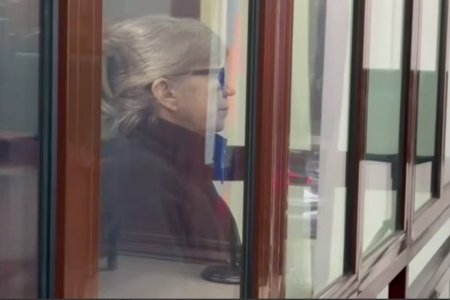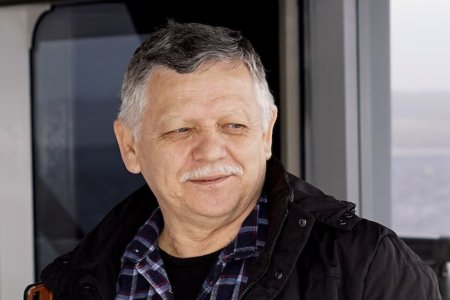
Guriy Kornilyev, a botanist from Yalta, has been “indefinitely” banned from entering Russian-occupied Crimea and, thus, prevented from returning to his 76-year-old mother who needs care. This is the latest of repeated reprisals against the Ukrainian scientist for his formal rejection of Russian citizenship after Russia’s invasion and annexation of Crimea.
Up till now, Kornilyev’s written rejection of Russian citizenship had caused many problems, but had not prevented him from remaining in Yalta, together with his mother. The Crimean Human Rights Group explains that Kornilyev was issued with papers to remain in occupied Crimea while he was in possession of a current Ukrainian passport. His passport was due to expire in June 2024, with this leaving him no choice but to leave occupied Crimea in order to renew it. He set off on 15 April, crossing into Russia and then Georgia. In order to do this, Kornilyev set off from Crimea on 15 April, crossing into Russia and then Georgia, where he planned to renew his passport at the Ukrainian embassy. Kornilyev recalls that the Russian border guards did hint, when he was registering for the flight from Sochi to Georgia that he might have difficulty returning to “the Russian Federation” (and occupied Crimea) since he was refusing to take Russian citizenship. He was, however, convinced that this was simply psychological pressure and that he would be able to return. In any case, it is hard to see what choice he had, as he needed a current Ukrainian passport.
After organizing his passport, Kornilyev crossed from Georgia into Armenia, from where he needed to travel to Moscow in order to catch a flight to occupied Crimea. On his arrival at Moscow’s Sheremetyevo Airport on 22 April, he was, like all Ukrainian citizens, subjected to Russia’s so-called ‘filtration’. One of the numerous stages of the ‘filtration’ process involved filling in a form demanding information about all relatives in Ukraine, links with the Ukrainian Armed Forces or authorities. There were also questions, such as whether the person supports what the form followed Russia’s official narrative in calling the ‘special military operation’ (i.e. the war of aggression against Ukraine). Kornilyev wrote that he does not support this, while giving an affirmative answer to a separate question about whether he supports Ukraine’s leadership.
All Ukrainian citizens were also told to hand over their laptops and mobile telephones ‘for checking’. After scrutinizing the contents of these electronic devices, as well as the questionnaires, they were subjected to so-called ‘conversations’, otherwise known as interrogation by FSB officers. In Kornilyev’s case, the FSB officer demanded to know, for example, why he had not taken Russian citizenship; claiming that this showed “an anti-Russian position” and that he was “demonstratively awaiting the Ukrainian Armed Forces” in Crimea. Kornilyev was also asked “whose country is Crimea?” to which he answered that, in accordance with international law, Crimea is Ukrainian territory.
The FSB officer made it clear that Kornilyev had given ‘the wrong answers’ and that there was no place for him in what he claimed to be the Russian Federation, while knowing that Kornilyev merely wanted to return to Crimea.
It was after this ‘conversation’ that Kornilyev was informed of an “indefinite ban on entering the Russian Federation”, with this covering any territory, including Crimea, currently under Russian occupation. The Russians ignored the fact that Kornilyev had left occupied Crimea for just a week in order to renew his passport, and that he needs to be in Yalta to care for his elderly mother. They were doubtless aware that, even without considering the illegality of Russia’s occupation of Crimea, such enforced separation of family members is in violation of Russia’s international human rights commitments since they refused to provide any written confirmation of the ban.
All the Ukrainian citizens at Sheremetyevo had fingerprints taken, while those being denied entry were also forced to give DNA samples. Around 50 Ukrainian citizens were refused entry to the RF and occupied Ukraine and were sent back to where they had arrived from.
Kornilyev had made his opposition to Russia’s invasion and occupation of Crimea clear from the outset. After Russia’s formal annexation on March 18, 2014, he had, he later told the Crimean Human Rights Group, decided that he must, whatever happened, reject Russian citizenship “so as not to give Putin even the formal grounds to protect me as a Russian-speaking citizen.”
In 2016, after two years of harassment because of his refusal to take Russian citizenship, Kornilyev was dismissed from his post as botanist at the Yalta Botanical Gardens. At the time, he told the Crimean Human Rights Group that another colleague who had refused Russian citizenship had been made ‘redundant’, while another had lost his managerial post and resigned.
It was only six years later that Kornilyev finally managed to find work as an engineer at an institute for the wine industry, although not as a research assistant because of his supposed “foreign citizenship”. This did not last, however, because the management came under increased pressure from the FSB for hiring a person regarded as ‘suspect’, and he was forced to resign in February 2022. Guriy Kornilyev is currently in Kyiv where friends have managed to get him a room in a hostel. His mother has been left alone in Yalta.
See also: Russia bribes soldiers with land plundered from real owners in occupied Ukraine



